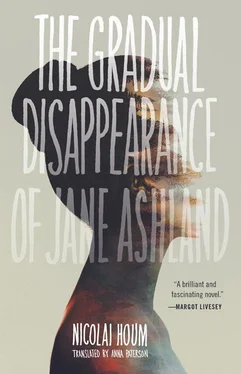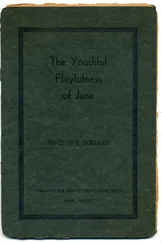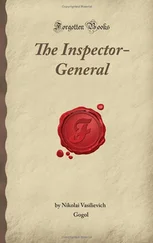“Look at its perfect shape!”
It reminded her of the rough horns of plenty that children used to draw in school for Thanksgiving.
“Cladonia fimbriata, or trumpet lichen. Belongs to the class of Lecanoromycetes. This is one of the wonders of nature. No need to look any further for wonderfulness. I can tell you exactly how it originated and why it grows in this habitat.”
“I don’t doubt that at all.”
Ulf threw the moss away. She had expected him to return it to the stone reverently, which would, one way or the other, have supported the point he had made.
Then he raised the binoculars that hung around his neck, placed his legs well apart, and started turning slowly.
“Musk oxen are harder to spot in the autumn when the heather has turned brown.”
She considered using her binoculars, too, but they were in the bottom of her rucksack.
“Because the musk oxen are brown as well,” Ulf added.
“I get it,” Jane said.
He was reaching the end of a panoramic scan carried out evenly and methodically, and didn’t seem bothered when the binoculars pointed straight at her face.
“Do you see anyone?” she asked.
“No one,” he said.
When they stopped the first night, Ulf walked down to a mountain stream that had carved a gully in the ground behind their campsite. A good-sized gully, but not deep enough to leave it in any doubt that he was naked. Afterward, he went over to her and stood in full view with a tiny, green microfiber towel as a loincloth. He was in great shape and almost certainly noticed that she noticed.
Jane started to pull the tent out of its bag.
“Is that a tattoo you’ve got there?” Jane asked.
Ulf came closer and contracted one pectoral muscle.
“It symbolizes freedom,” he said.
The tattoo showed an eye.
“It’s an eagle’s eye. I’ve always been interested in eagles.”
“ Isn’t everyone?”
“But I figured having an entire eagle would be a little banal, so just the eye seemed like a better idea.”
“How’s one to know that it’s the eye of an eagle? Not the eye of a parakeet, say?”
“How does one know?” His eyebrows moved a little higher up. He drew a small circle on his chest muscle.
“You knew from the prominent shadow here, almost like an eyebrow.”
She leaned closer to him.
“Boo!” he shouted and pressed his chest against her face. “The eagle attacks!”
She had made up her mind to erect her tent, say that she was very tired, which happened to be true, too, and crawl into her sleeping bag at once. While Ulf got dressed, she dragged the inner and outer sheets, the tent pins, and an unlikely number of lengths of rod out of the olive-green tent bag. Naturally, there was no set of instructions. In Norway, anything to do with tents was supposed to be common knowledge.
While she struggled with the tent, she sensed Ulf observing her.
“Jane. About those books of yours?”
He was stirring a bagful of freeze-dried food. It was the first time he had shown any interest in her work—or, what had been her work.
“What kind of novels are they?”
“I don’t know what to say… just, novels.”
She hadn’t meant to sound curt but his question was one she had always found difficult to deal with. She stood still, a piece of tent rod in each hand, and thought about The Age of Plenitude . She had written it as if she still lived in the time before the September 11 attacks, before the economic crisis. While other writers had taken on board the seriousness of the times, she had carried on focusing on smaller causes and effects. But why shouldn’t she? Her world had not changed. She didn’t know many people who had lost their jobs, and no one who had died when the Twin Towers collapsed. Presumably, many readers had been in the same situation, since the book sold so well. But the sales could also reflect a need for escapism, something similar to the seventies pop tune “Happy Times” shooting to the top of the music charts in the middle of the grimmest recession since the Great Depression.
Besides, what she wrote was not easygoing or far from real life. She wrote about unrequited love, social anxiety, weariness. And she had tackled such themes again in her last manuscript. It was never completed. She had reached page 104 of the story about a woman who had a comfortable life with uncomplicated existential challenges until the all-powerful Author decided it was time for some high seriousness and an old, cold metal arm swung down from Heaven and flattened her under a period.
“I read mostly professional stuff,” Ulf said.
“Of course, that makes sense.”
She had managed to slot two equally long rods together.
“But when I read fiction, I like a good story. Preferably with new subjects to learn about. You know, like historical events. Do you write about historical events?”
“I don’t write anymore, you know that.”
“But when you did, was it about history?”
“No, it wasn’t.”
“What are your books about, then?”
She shrugged.
“A book must be about something, surely?”
“Must it? Can’t it be about lack of action? Like Seinfeld .”
“I don’t like Seinfeld .”
Yet another difference between them that, for a few long seconds, she allowed to grow into a huge, all-encompassing sense of loneliness.
“Are you sure you know what to do? Can I help?” he asked.
She had managed to insert several of the rods into place and had pulled the tent into an arch that looked completely unsafe.
“You concentrate on your tent and leave me to mine,” Jane said.
“My own tent?”
“That’s right.”
“I didn’t bring a tent. Now that we’ve got yours.”
The next day, fog was beginning to well up from the bottom of the valley. She trudged along behind Ulf again but the walking was tougher now. As the day wore on, it grew harder to share his enthusiasm about the many sightings of musk ox excrement. Maybe the tension that was growing between them had something to do with this. Her lack of interest in turds.
He walked with his chest thrust forward and his arms swinging vigorously, as if wading through deep water. Suddenly he exclaimed, “And then they come along and tell me that I won’t have access to the biodiversity labs. Top priority for phylogenetic systematology and evolution, if you please.”
She had no idea who they were and wasn’t too sure about phylogenetic either. But in one way at least, all that was still within her field: the correct term for what Ulf had been saying is egocentric speech , a survival from an early phase in children’s speech development. At that stage, the child doesn’t recognize any clear boundaries between itself and the outside world, and doesn’t take into account that it might have information that isn’t available to whoever is listening.
There was another possibility, namely that Ulf had continued a line of thought he had been holding forth about but that she had missed because she had been walking just behind his back.
“He stole my boot when we were playing fire truck so I peed on the roof,” Jane said in a low voice.
But Ulf didn’t register that she had said anything.
Before they had finished erecting the tent, the wind was back and the fog too. She used to think wind and fog couldn’t occur at the same time, that the two meteorological phenomena were mutually exclusive. How long could weather like this continue? Ulf didn’t say. But the truth was: for days on end.
They were sitting in her tent drinking coffee when Ulf suddenly put his arm around her and pulled her close.
“We’ll find them soon,” he said.
Читать дальше












